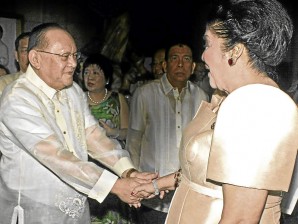‘Strongest testament to Marcos plunder’

Business magnate Eduardo “Danding” Cojuangco shakes hands with former first lady Imelda Marcos during the 40th wedding anniversary of Miriam and Narciso Santiago in 2011. INQUIRER FILE PHOTO
It’s the “strongest testament” to Eduardo “Danding” Cojuangco Jr. and the late dictator Ferdinand Marcos’ purported plunder of the coco levy funds.
Militant peasant groups said on Thursday as they cheered the Supreme Court for ruling with finality that the shares of Cojuangco in United Coconut Planters Bank (UCPB) were owned by government to be used for the benefit of coconut farmers.
“The SC ruling did not only strengthen the small coconut farmers’ legitimate claim over the 72.2 percent shares in UCPB but reaffirmed the historical truth that President Aquino’s uncle plundered the coco levy funds,” said Willy Marbella, deputy secretary general of Kilusang Magbubukid ng Pilipinas (KMP).
Chair Andres Bautista of the Presidential Commission on Good Government said his agency was working with the Department of Finance and Philippine Deposit Insurance Corp. on the “best course of action” that would enable farmers to benefit from the assets as directed by the court.
In its en banc meeting on Tuesday, the high court said the shares of stock Cojuangco received after negotiating the acquisition by the Philippine Coconut Authority (PCA) of First United Bank, which was later renamed UCPB and which became the depository of coconut levy funds, were public funds.
Article continues after this advertisementThe value of the contested shares was not immediately known, but a former UCPB director said it was a “pittance” compared to the 20 percent of the sequestered shares of stock in San Miguel Corp. (SMC), worth P60 billion, awarded to Cojuangco by the court last year.
Article continues after this advertisementFarmers said this portfolio was acquired by Cojuangco using the coconut levy imposed by Marcos from 1973, a year after the declaration of martial law, until 1982, ostensibly to stabilize consumer prices of products manufactured from coconut.
A dissenting justice called the ruling the “biggest joke to hit the century.”
Another block of 27 percent of sequestered SMC shares, likewise acquired with the levy money, was awarded by the court in a decision, also finalized last year, to the farmers to be used for their benefit and the development of the coconut industry. It was worth more than P70 billion.
Unconstitutional
In its November 27, 2012, decision, the high tribunal declared as unconstitutional provisions in the agreement between Cojuangco and the PCA on May 25, 1975, which allowed the businessman, known to be a Marcos crony, “to personally and exclusively own public funds or property.”
The agreement provided for the transfer to Cojuangco, “by way of compensation,” of 10 percent of the 72.2-percent bloc of shares that the PCA purchased using the coconut levy funds.
The KMP and Coco Levy Funds Ibalik sa Amin said that “in light of the SC ruling, we demand Aquino to immediately return to small coconut farmers the whole 72.2 percent shares in UCPB along with the more than P70 billion recovered from SMC in October last year.”
The peasant groups also called on Congress to immediately tackle House Bill No. 1327, or the “Genuine Small Coconut Farmers’ Fund Act of 2013,” filed by Anakpawis Rep. Fernando Hicap.
HB 1327 proposes that the coco levy assets should not be a part of the government’s general funds and should be used exclusively for the benefit of genuine small coconut farmers. It also seeks to attempt to meet the coconut farmers’ demand for the “cash distribution of the recovered funds.”
Act now, Aquino urged
Government officials have repeatedly rejected demands to distribute the coco levy funds to individual farmers or farmer groups, saying these should be put into investments that would benefit them and the coconut industry.
Jansept Geronimo, secretary general of Coalition of Coconut Farmers of Quezon, said over the phone that the SMC assets had not yet been programmed by the Aquino administration to address the sorry plight of the coconut farmers. “And worse, it is now being targeted by several national government agencies as a well of funds for their respective projects and programs,” he said.
Geronimo said the coco levy fund should remain intact as a perpetual trust fund for the coconut industry until a law is passed and policies are set on how best it could be used to benefit the coconut farmers.
“But the Aquino administration should act fast before it’s too late for the old, sick and dying coconut farmers who contributed to the levy fund,” he said.
The National Anti-Poverty Commission has been pushing the allocation of P11.17 billion from the fund for its poverty reduction program for the coconut industry. The Department of Agrarian Reform is looking at the fund to finance support services for agrarian reform beneficiaries. The Department of Social Welfare and Development also wants to use the money. With reports from Gil C. Cabacungan and Dona Z. Pazzibugan